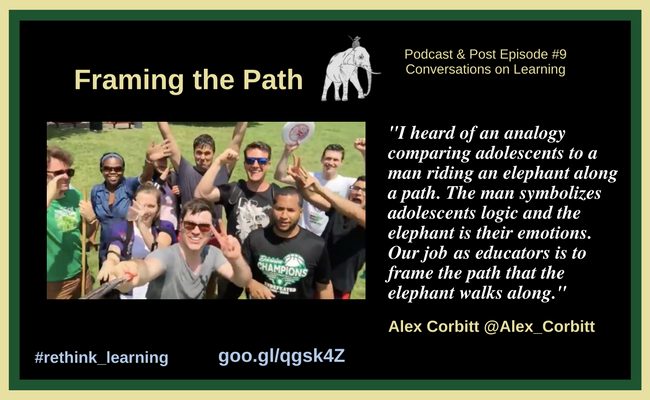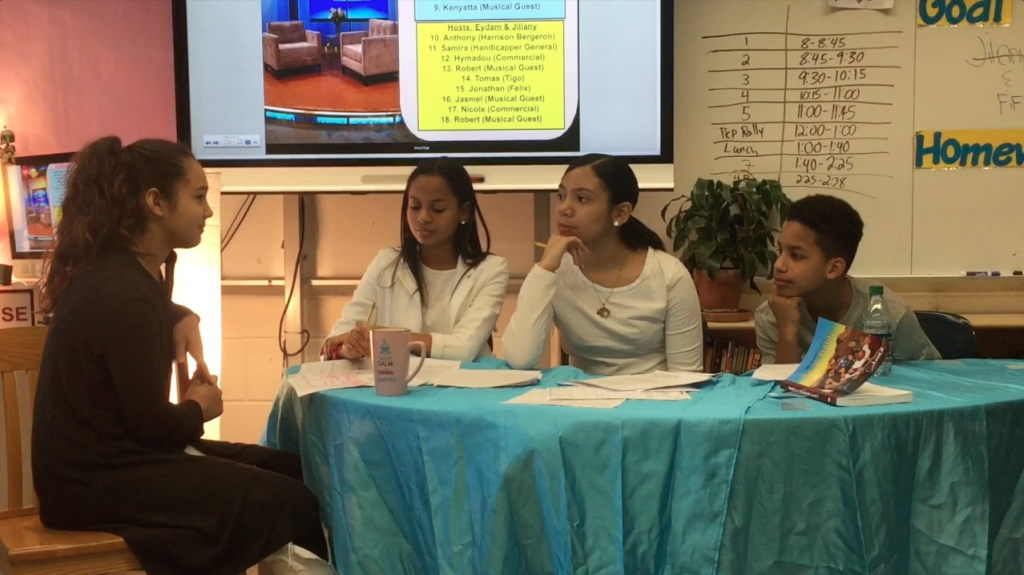Alex Corbitt is a middle school English teacher in The Bronx, New York. His work focuses primarily on socio-emotional learning, gamification, education technology, and literacy. Alex’s passion for teaching will thrive as long as he continues to laugh with and learn from his incredible students.

Podcast: Play in new window | Download
Subscribe: Spotify | TuneIn | RSS
I met Alex on Twitter and was so impressed with how active he is on social media. When I asked Alex if he would join me in a conversation on my podcast series, he was so open about sharing that I couldn’t wait to talk to him. After our conversation, I found that he was leaving the next day for a big family trip overseas. Alex made sure he accommodated me and my time and sent me amazing resources for the blog post. Below are excerpts from the conversation. I hope you listen to the whole podcast and enjoy the conversation with Alex as much as I did.
Can you share your background, where you live, and your role as a middle school English teacher in the Bronx?
I grew up in a suburb of New Jersey and attended Fordham University as an undergrad which was my introduction to New York and the Bronx. I live in a Queens, NY since coming here for college and love it here because of the food, music, just exploring the city, going to museums, and hanging out with friends. I have been working at a small middle school in the Bronx right near Yankee stadium for about 5 years now. A fun fact is that I teach in the same classroom that I did my student teaching. I had a great mentor who was transitioning into a leadership role so he said to me, “why don’t you just stay here?” So I did. The school is in a community with a lot of high needs population with 99% qualifying for free and reduced lunch. I work with predominantly Dominican, Puerto Rican, and West African students. They are all incredible even in the face of challenges. We are all a big family, and I get support and trust from the parents. My co-teacher and I also have 2 ICT classes with students with special needs and general students.
You said one of your focuses is on socio-emotional learning. Can you explain why socio-emotional learning is so important?
When I was in grad school, I heard of an interesting analogy comparing adolescents to a man riding an elephant along a path. The man symbolizes adolescents logic and the elephant is their emotions. Our job as educators are to frame the path that the elephant walks along. That spoke a lot to me. Before I try to appeal to my students’ rationale thought, I want to be very mindful of the space that I create is a space of emotional support. Really tending to the elephant metaphorically. As an educator am I creating a space that is safe emotionally, physically, and academically. The way to do is not by lecturing them, but rather to be a model of what you want to see. For example, if I want my students to take academic risks, I need to be at the head of that endeavor. I need to take academic risks and even fall on my face. We can all laugh together so we can help each other. I always try to be mindful jumping into whatever activity I ask them to do and be right by their side.
What do you do at the beginning of the year to build the culture of learning?
I have been outlining ideas about building a culture so this is a great question. One thing I do within the confines of a 55 minutes period is trying to find time in between classes to find out what their interests are and information about their culture. I always tell them on the first day of school that they don’t know me yet, and I don’t know them very well, but I’m going to put myself out there and tell them right away that I have their back. I tell them that I struggle and have bad days just like everyone else. I became a teacher because I get a big kick out of kids. I love laughing. I want them to know that I’m here to support them. I teach 7th grade. I wouldn’t say this in a school setting but another analogy. Some people call middle school like whiskey. At first, the taste is really yucky but over time you grow a taste for it. When I came into the 7th-grade setting, the kids were so genuine and honest. They really challenged me to be vulnerable and just. It’s been fun. If I feel like I’m losing a kid, I question myself what I’m not doing with them. That’s when I need to connect to them and let them know I care. Kids have a lot of compassion to reciprocate if I have a bad day. We really become a family.
How important is it to have support from administrators?
When I talk about my school setting and how I run my classroom, experienced educators and coaches can sense that I have a good administration, and I do. My principal is very open-minded, very compassionate and very progressive. She empowers us to go with our gut to put kids first. We are in a place right in the middle of the achievement gap. Our test scores are tough. There is the temptation for administration to go right into test prep and squash all love of learning. My principal has the deep courage to not do that even though her instincts might be to order the books and hand them out.
My life has been on educational technology for years and you mentioned that and gamification. How do you integrate those in your classrooms?
Our school is not a 1:1 school so all kids do not have the laptops or tablets. One thing that I’ve learned is that gamification can take many forms. Any learning experience can reflect video game design. You can choose your own character, you gain experience points, you level up, and you earn badges. We try to bring the principles into pedagogy. I can give you two examples. I facilitate projects that require my kids to pick roles and to role-play.
One that I do is a talk show project where you have so many different jobs: the host, guest, writers, musical guests, commercials. With each role, my kids can dictate the way they can critically engage with the project. The purpose of the project is that all the guests on the talk show are acting as characters from the books they are reading. So they have to go back to have a deeply intimate understanding of their character so when the hosts interview them, they can embody that character and speak with authority. It’s a lot of fun and doesn’t feel like school. There are multiple kids doing different things at the same time whether up front or behind the scene. That’s one way I add character roles in my class.

Another form of gamification is when I launch argumentative writing. A good argument needs to have a claim, back it up with reasons, cite textual evidence, and a rule or some type of evidence that backs up your claim. When I added a form of gamification, it skyrocketed the whole intellectual endeavor. The way I frame it now is that I put my students in the context of being a crime scene detective. All good detectives need to be able to argue very well. This is not my idea.
I got this from George Helix wrote a book on an argument where he suggests that you take comic book mysteries that can be solved with argumentative thinking. I took that and we look at mystery comics, mystery graphics, and then we read stories of different mysteries that are open-ended. The students work in groups or independently trying to use argumentative writing to claim who they think is the murderer, giving reasons and citing textual evidence. They are warranting their thinking by how evidence ties back to who they think who did it. Here’s an idea of Crime and Puzzlement and comic for Arsonist Mysteries below:


I saw that you created and produced the “Teacher on the Street” segment for NCTE’s Voices from the Middle Podcast. Can you tell me more about how you came up with this and about some of the segments?
One thing that gets me inspired is being part of larger professional communities and learning from other teachers. I learn a ton from my peers at school and learn from folks on Twitter. Recently I went to Apple’s ADE Academy and learned so much. I produce NCTE Voices from the Middle podcast to pick teacher’s brains about different topics and to learn about incredible things they are doing in their classrooms. I definitely do it for the listeners of the podcast, but I also do it for myself. I learn so much every time I create an episode and I encourage you and your listeners to look for the next installment coming out in a few weeks where I talk to my students to get feedback from them.
An episode of my “Teacher on the Street” segment for NCTE’s VFM Podcast: https://soundcloud.com/voices-fromthemiddle/episode-15
I just don’t know how you do everything and teach full-time. Then I found the Litcraft Bundles of teacher materials. When and why did you create these?
I worked very closely with an artist Ryan Valice who did all of the design and artwork. I gave him rough drafts and he turned them into great designs. I am under no illusion or believe that teacher instruction is the best way to become a good reader. I place a lot of value into independent reading so I created a system that I now call Litcraft. I set different benchmarks on a poster that goes back to the idea of gamification. All of my kids start on the first level in September which is “Reading Apprentice.” After they read 2 or 3 books, they move up to “Reading Knight.” Then they level up to Reading Ninja → Reading Master → Reading Titan by reading more books. I created bookmarks that go with it. So as my kids walk around the school with their color bookmark sticking out of their books, there is a sense of pride of what level they read up to. It gamified reading by kids becoming better readers by achieving new levels in Litcraft and getting new bookmarks. They are gaining new responsibilities and abilities in the classroom. They love to show off their bookmarks and are proud of their achievements. My next was how to share this with others. At first, I was sending people my pdfs of the materials I made personally, but eventually, I needed a way to roll this out in a bigger capacity. So that’s how Litcraft started.
What do you have planned for this coming school year?
I’ll be super honest. I have absolutely no idea. I have lots of ideas swimming in my head right now especially after returning from ADE in Texas. I am going to use August as my Sunday – planning all Sunday in August how to use technology in my classroom.
*****
 Alex Corbitt is a middle school English teacher in The Bronx, New York. His work focuses primarily on socio-emotional learning, gamification, education technology, and literacy. He loves learning from other teachers and he regularly presents at conferences around the United States. Alex’s passion for teaching will thrive as long as he continues to laugh with and learn from his incredible students.
Alex Corbitt is a middle school English teacher in The Bronx, New York. His work focuses primarily on socio-emotional learning, gamification, education technology, and literacy. He loves learning from other teachers and he regularly presents at conferences around the United States. Alex’s passion for teaching will thrive as long as he continues to laugh with and learn from his incredible students.
Alex’s website https://www.alexcorbitt.com/
Follow Alex on Twitter: @Alex_Corbitt
*****
Interested in checking out more of the Rethinking Learning podcasts and reflections, click on the podcast tab at the top, the logo below, or go to https://barbarabray.net/podcasts/
For more information about Barbara’s book, Define Your WHY, go to this page or click on the image of the book for resources, questions, and links.






